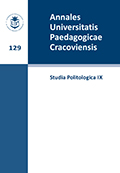Postawy adaptacyjne duchowieństwa wobec władzy w okresie PRL
Abstract
After World War II, the authorities intensively monitored the attitudes of the priests. It was an element of the wide-ranging policy of weakening the position of the Church and disintegration of the clergy. In their reports, the apparatus of the Polish United Workers’ Party and the workers of the Ministry of Public Security of Poland and the Security Service of the Ministry of Internal Affairs placed the attitude of the priests into three groups: “reactionists”, “positive” and “undecided”. In the 1960s the third group was also called “moderate.” The biggest group of adaptive attitudes towards the existing system of the power consisted of priests classified by the authorities as “positive” and so-called “undecided” or “passive” priests. They tried to adapt to the tough conditions and to find their place in the existing reality to survive. They wanted to live peacefully. Many priests, due to their age, had no power to face the increasing confrontation with the authorities. Their attitude meant accepting the existing social and political order and limiting their activity only to the priestly activity. One also needs to take into consideration the various activities that were undertaken by the institutional Church and the priests who tried to make their activities more effective and adjust them to the evolving social and political conditions of the Polish People’s Republic. Co-operation of few of the priests with the Security Service is considered a specific and extreme form of the adaptive attitude.Downloads
Published
2015-08-07
Issue
Section
Scientific paper
License
Redakcja przyjmuje do druku teksty oryginalne, wcześniej niepublikowane. Treść czasopisma jest dostępna na licencji Creative Commons (CC-BY-NC-ND 3.0 PL)
Licencja ta zezwala na wykorzystanie materiałów opublikowanych w czasopiśmie w celach niekomercyjnych np. komentarza, krytyki, informacji, archiwizacji, nauczania lub prowadzenia badań, z poszanowaniem aktualnie obowiązującego prawa autorskiego (ustawa z dnia 4 lutego 1994 r. o prawie autorskim i prawach pokrewnych Dz.U. 1994 nr 24 poz. 83 z poźn. zm.). Zgodnie z wymogami licencji, konieczne jest dokładne podanie źródła cytowania lub parafrazowania oraz zachowanie tekstu w oryginalnej postaci (zakaz tworzenia utworów zależnych).

